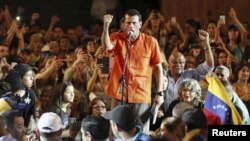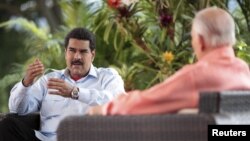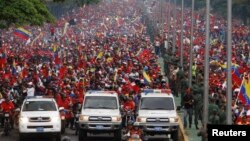CARACAS —
Venezuelan opposition presidential candidate Henrique Capriles on Monday vowed to end the OPEC nation's shipments of subsidized oil to communist-run Cuba, slamming acting President Nicolas Maduro as a puppet of Havana.
Capriles has berated Maduro as a weak imitation of the late Hugo Chavez, whose death two weeks ago convulsed the country and triggered the April 14 vote. The opposition also accuses the government of failing to fight crime and control inflation.
"The giveaways to other countries are going to end. Not another drop of oil will go toward financing the government of the Castros," Capriles said, referring to Cuba's present and past leaders, Raul and Fidel Castro.
"Nicolas is the candidate of Raul Castro; I'm the candidate of the Venezuelan people," Capriles said during a speech to university students in the oil-rich state of Zulia.
The election marks the first test of the "Chavismo" movement's ability to maintain the late leader's radical socialism after his death, and it will be crucial for regional allies that depend on Caracas for financing and cheap fuel.
A victory for Capriles, 40, would likely give global oil companies greater access to the world's largest crude reserves and offer investors more market-friendly policies after years of state-centered economics.
Maduro, a 50-year-old former bus driver seen as having the advantage in the vote, has vowed to continue Chavez's economic model that included frequent nationalizations and heavy regulation of private enterprise alongside generous social welfare programs that underpinned his popularity.
The youthful Capriles, who lost to Chavez by 11 percentage points in 2012, faces a delicate balancing act to highlight the flaws of Chavez's governance without appearing to be attacking the former president or seeking to tarnish his legacy.
He has exchanged furious barbs with Maduro since launching his candidacy and renewed his criticisms from last year's campaign over day-to-day problems such as unchecked crime, product shortages and high cost of living.
"Every day it's harder to find food, and every day food is more expensive," Capriles said. "This model is not viable."
He said halting cheap oil sales to Cuba would free up resources to boost public employee salaries by 40 percent to make up for inflation that is one of the region's highest.
Vicious Campaign
Ties to Cuba are likely to remain a central part of the campaign. Capriles for months accused authorities of compromising the country's sovereignty by letting Chavez govern for two months from a Havana hospital.
Venezuela provides close to 100,000 barrels per day of oil to Cuba in exchange for a host of services including doctors that staff free health clinics in slums and rural areas.
Supporters say it has helped expand access to health care, while critics call it a mere subsidy to the Castro government.
Maduro's frequent visits to the island during Chavez's two-month convalescence there led opposition leaders to joke that he had picked up a Cuban accent.
The emotional outpouring of affection for Chavez following his March 5 death, along with ample use of government television broadcasts, has helped give Maduro a leg up in the race.
Millions of bereaved supporters have lined up before Chavez's remains to pay respects to a leader who was loved by many of the country's poor but reviled by adversaries who called him a fledgling dictator.
Maduro Lead
Two recent opinion polls showed Capriles trailing Maduro.
Respected local pollster Datanalisis gave Maduro 46.4 percent versus 34.3 percent for Capriles in a survey carried out before Chavez's death.
He enraged Maduro by accusing him of repeatedly lying about the late president's two-year battle with cancer, and of then cynically using his death as a campaign tool. He later apologized to Chavez's family if his words had offended them.
Maduro last week described a plot by "far right" U.S. elements linked to two senior former members of the George W. Bush administration to kill Capriles.
Both officials denied the charges.
Capriles has berated Maduro as a weak imitation of the late Hugo Chavez, whose death two weeks ago convulsed the country and triggered the April 14 vote. The opposition also accuses the government of failing to fight crime and control inflation.
"The giveaways to other countries are going to end. Not another drop of oil will go toward financing the government of the Castros," Capriles said, referring to Cuba's present and past leaders, Raul and Fidel Castro.
"Nicolas is the candidate of Raul Castro; I'm the candidate of the Venezuelan people," Capriles said during a speech to university students in the oil-rich state of Zulia.
The election marks the first test of the "Chavismo" movement's ability to maintain the late leader's radical socialism after his death, and it will be crucial for regional allies that depend on Caracas for financing and cheap fuel.
A victory for Capriles, 40, would likely give global oil companies greater access to the world's largest crude reserves and offer investors more market-friendly policies after years of state-centered economics.
Maduro, a 50-year-old former bus driver seen as having the advantage in the vote, has vowed to continue Chavez's economic model that included frequent nationalizations and heavy regulation of private enterprise alongside generous social welfare programs that underpinned his popularity.
The youthful Capriles, who lost to Chavez by 11 percentage points in 2012, faces a delicate balancing act to highlight the flaws of Chavez's governance without appearing to be attacking the former president or seeking to tarnish his legacy.
Henrique Capriles
Henrique Capriles
- 40 years old
- Lost 2012 presidential election to Hugo Chavez
- Governor of Venezuela's second-most populous state, Miranda
- Jailed in 2002 for fomenting a protest near the Cuban Embassy, later acquitted
- Was Venezuela's youngest legislator
- Lawyer by training
- Descendant of immigrants from Europe
"Every day it's harder to find food, and every day food is more expensive," Capriles said. "This model is not viable."
He said halting cheap oil sales to Cuba would free up resources to boost public employee salaries by 40 percent to make up for inflation that is one of the region's highest.
Vicious Campaign
Ties to Cuba are likely to remain a central part of the campaign. Capriles for months accused authorities of compromising the country's sovereignty by letting Chavez govern for two months from a Havana hospital.
Venezuela provides close to 100,000 barrels per day of oil to Cuba in exchange for a host of services including doctors that staff free health clinics in slums and rural areas.
Supporters say it has helped expand access to health care, while critics call it a mere subsidy to the Castro government.
Maduro's frequent visits to the island during Chavez's two-month convalescence there led opposition leaders to joke that he had picked up a Cuban accent.
The emotional outpouring of affection for Chavez following his March 5 death, along with ample use of government television broadcasts, has helped give Maduro a leg up in the race.
Millions of bereaved supporters have lined up before Chavez's remains to pay respects to a leader who was loved by many of the country's poor but reviled by adversaries who called him a fledgling dictator.
Maduro Lead
Two recent opinion polls showed Capriles trailing Maduro.
Nicolas Maduro
Nicolas Maduro- Venezuelan vice president, Hugo Chavez's chosen successor
- Former foreign minister
- Was a member of assembly that drafted a new constitution after Chavez's 1998 election
- Campaigned for Mr. Chavez's release from prison in the 1990s
- 50 years old, former bus driver
He enraged Maduro by accusing him of repeatedly lying about the late president's two-year battle with cancer, and of then cynically using his death as a campaign tool. He later apologized to Chavez's family if his words had offended them.
Maduro last week described a plot by "far right" U.S. elements linked to two senior former members of the George W. Bush administration to kill Capriles.
Both officials denied the charges.







